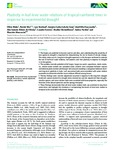Please use this identifier to cite or link to this item:
http://www.alice.cnptia.embrapa.br/alice/handle/doc/1047926| Title: | Plasticity in leaf-level water relations of tropical rainforest trees in response to experimental drought. |
| Authors: | BINKS, O.  MEIR, P.   ROWLAND, L.   COSTA, A. C. L. da   VASCONCELOS, S. S.   OLIVEIRA, A. A. R. de   FERREIRA, L.   CHRISTOFFERSEN, B.   NARDINI, A.   MENCUCCINI, M.   |
| Affiliation: | Oliver Binks, University of Edinburgh; Patrick Meir, University of Edinburgh / Australian National University; Lucy Rowland, University of Edinburgh; Antonio Carlos Lola da Costa, UFPA; STEEL SILVA VASCONCELOS, CPATU; Alex Antonio Ribeiro de Oliveira, UFPA; Leandro Ferreira, MPEG; Bradley Christoffersen, Earth and Environmental Science, Los Alamos National Laboratory; Andrea Nardini, Universitá di Trieste; Maurizio Mencuccini, University of Edinburgh / ICREA at CREAF. |
| Date Issued: | 2016 |
| Citation: | New Phytologist, v. 211, n. 2, p. 477-488, July 2016. |
| Description: | The tropics are predicted to become warmer and drier, and understanding the sensitivity of tree species to drought is important for characterizing the risk to forests of climate change. This study makes use of a long-term drought experiment in the Amazon rainforest to evaluate the role of leaf-level water relations, leaf anatomy and their plasticity in response to drought in six tree genera. The variables (osmotic potential at full turgor, turgor loss point, capacitance, elastic modulus, relative water content and saturated water content) were compared between seasons and between plots (control and through-fall exclusion) enabling a comparison between short- and long-term plasticity in traits. Leaf anatomical traits were correlated with water relation parameters to determine whether water relations differed among tissues. The key findings were: osmotic adjustment occurred in response to the long-term drought treatment; species resistant to drought stress showed less osmotic adjustment than drought-sensitive species; and water relation traits were correlated with tissue properties, especially the thickness of the abaxial epidermis and the spongy mesophyll. These findings demonstrate that cell-level water relation traits can acclimate to long-term water stress, and highlight the limitations of extrapolating the results of short-term studies to temporal scales associated with climate change. |
| Keywords: | Plasticidade Relações hídricas Seca experimental Anatomia foliar |
| DOI: | 10.1111/nph.13927 |
| Type of Material: | Artigo de periódico |
| Access: | openAccess |
| Appears in Collections: | Artigo em periódico indexado (CPATU)  |
Files in This Item:
| File | Description | Size | Format | |
|---|---|---|---|---|
| nph13927.pdf | 524,74 kB | Adobe PDF |  View/Open |









